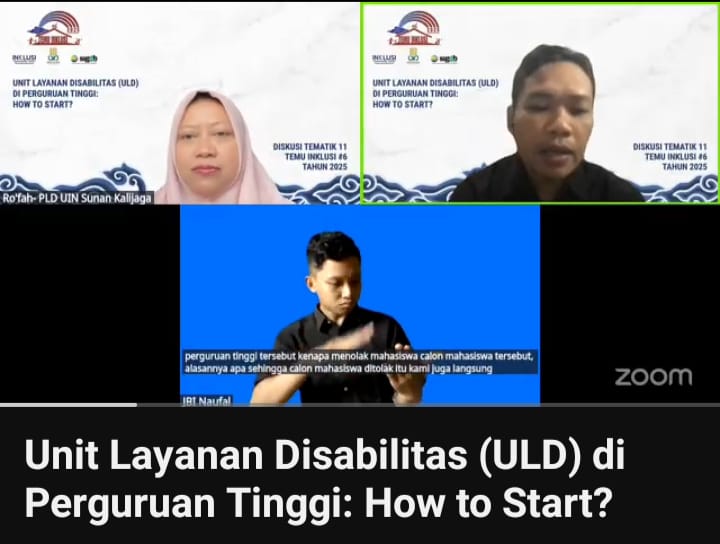The higher the education institution, the less participation of people with disability. This reflects structural challenges at higher education. Hence, the Disability Service Unit (AYL) is there to facilitate inclusion in higher education including amongst lecturers that would allow for better quality of education for people with disability.
Yet the key problem that often come up from personal experience and from the general public has to do technical services. This is what transpires during a thematic discussion by Sigab, on Friday (15/8) on Disability Service Unit at higher education.
The question then is what are the good practices, within the policy context in Indonesia, particularly in relations to the ministries of education and religion?
Fajar Priyautama (Higher Education, Science and Technology) says that there are already regulations and policies regarding Disability Service Unit at higher education – such as laws, government regulations, and Minister Regulation No. 48 Year 2023, so it is just a matter of their implementation. A number of ministerial programs to support the Disability Service Unit include aid program for the implementation and consolidation of Disability Service Unit and improvement in facility.
Sahiron (Ministry of Religion) says that there are priority activities and autonomy within higher education as scientific community – known as healthy, safe and inclusive campus. The technical activities implemented by universities include strengthening of Disability Service Unit. The Ministry of religion has its own activity – strengthening community education, and establishing unit to address sexual violence, as students with disability are vulnerable, hence it is important to ensure their safety and comfort.
The discussion moderator, Ro'fah then asks the question of whether there are recommendation regarding the technical implementation? The Strategic Plans within the Ministry of Education, Science and Technology, and the Ministry of Education emphasise the above programs by insisting on the establishment of Disability Service Units that are implementable, and there are also associated rewards given by the National Planning Board, in relations to disability-friendly infrastructure.
There is already disability services associated with university accreditation and accessibility activities. This gives added values for universities to have disability service unit.
Farida (National Planning Board) discusses descent accommodation articulated in Law No. 8 Year 2016 on People with Disability, where the National Planning Board consulted the Ministry of Education, Science and Technology regarding Regulation No. 53 Year 2003 on Inclusion, as each disability has unique needs – i.e. people with vision disability has emotional issues and stress, and how to deal with such issue.
Disability Service Unit as the Authority of Rector
Sahiron adds that rectors have the authority for the disability service unit. As a unit, it is different from organization, yet a unit requires the existence of an organization. And the rector has the authority over a unit or unites, whatever that or they might be.
The Ministry of Religion supports inclusion because education is essentially for all people, regardless of gender, general and/or special ability. Everyone has access to their rights, there is no room for differences in terms of rights, although the presentation methods may differ one from the other. "The curriculum may differ, perhaps tailored to individual needs. Education curriculum is truly individual. It is important to recognize who has special needs. The ministry of religion is totally in full supports the idea of love-based curriculum." The latter is a non-formal, informal and formal, even digital education curriculum based on love for God and its positive impacts on human life that enables people to do good to others and to the universe. Love curriculum mean providing the right services to anyone through the heart. It includes equality of gender, disability, and for children.
Disability Service Unit at UIN Sunan Kalijaga – already 18 Years
Each university has the power to establish Disability Service Unit. The moderator, Ro'fah confirms that, and further says that the disability service unit at UIN Sunan Kalijaga is already 18 years old and is part of the governance. As an integral part of UIN, it has a budget allocation. This is a long measure that UIN cannot do on its own.
At the ministerial level, Ro'fah, a member of a Task Force, says that there is budget for lecturers, as indicated by the State Sharia Securities (SBSN) although not as evident as the road map established by the Ministry of Education, Science and Technology. The budget allocation and budget for lecturers are already in planning since 2020.
Sanctions for Those without Disability Service Unit
Fajar says that sanctions are crucial, and this is true of the three-year administrative sanctions imposed by the Ministry of Education, Research and Technology for education establishment that has not set up disability service unit. Universities are required to set up disability service unit within three years. There will be written reprimand after three years have passed without disability service unit, and such reprimand will be given three times, each with three-day expiry, then there will be termination of lessons. It is an obligation to set up a disability service unit in universities and the ministry has the obligation to facilitate it by setting up policies, and making available budget although only universities with high scores would get the budget.
In addition, there is also information dissemination at the beginning of the year, so there is time until the end of the year for university to establish disability service unit.
Farida explains that the sanctions from the National Planning Board, as decision-maker regarding policy orientation and strategies, elaborate that universities do not necessarily establish a stand-alone unit, but may also use existing unit. Regarding information dissemination and reputation, the Disability Service Unit may be integrated into other unit(s) that has (have) positive impacts on the university. So it is about positive and normative encouragement.
One important issue is branding, which is not only about branding but also implementation. (Ast)












